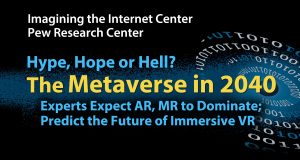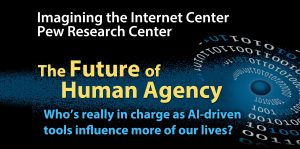Experts Predict the Evolution of XR and ‘the Metaverse’ by 2040 and Consider ‘The Future of Human Agency’ in the Digital Age
In 2022 Elon University and Pew Research asked experts to predict where advances in AI and extended-reality tools will take society by 2040, and, in a second canvassing (published in 2023), asked what the state of human agency might be by 2035
In 2022, in our 14th and 15th canvassings of experts since the early 2000s, we asked experts to share their thoughts in answer to two big questions. The results are featured in two reports that each analyze hundreds of experts’ responses: “The Future of the Metaverse in 2040” and “The Future of Human Agency. Each contains thousands of expert predictions regarding the likely evolution of humans and digital technologies in an age of accelerating change.
Please scroll down the page to find introductory details.
Report 1: ‘The Future of the Metaverse in 2040‘ – Released June 30, 2022
 How do people define ‘the metaverse’ in 2022 and what will be the likely future impact of extended-reality tools on the digital age? This report shares thousands of predictions in reply to the following question:
How do people define ‘the metaverse’ in 2022 and what will be the likely future impact of extended-reality tools on the digital age? This report shares thousands of predictions in reply to the following question:
Will the metaverse be a much-more-refined and truly fully-immersive, well-functioning aspect of daily life for a half billion or more people globally by 2040 – yes or no? Tell us how you imagine that the shift of many online activities into more-fully-immersive digital spaces and digital life is likely to take place. Regardless of how you see the timing of this, how might it change human society? What are the likely positives of this transition? What negatives may emerge? How might it change the daily lives of the connected? And how will this transition change the way we think about our world and ourselves? We are also interested in hearing your thoughts about the role blockchain and its applications might play in this evolution of online life by 2040.
The result was a fairly even statistical split. 54% said by 2040 the metaverse WILL be a much-more-refined and truly fully-immersive, well-functioning aspect of daily life for a half billion or more people globally. 46% said by 2040 the metaverse WILL NOT be a much-more-refined and truly fully-immersive, well-functioning aspect of daily life for a half billion or more people globally.
The simple quantitative results are not fully indicative of the full complexities of the topic. The important findings are found in the respondents’ rich, deep qualitative replies. Read the report for full details.
Report 2: ‘The Future of Human Agency’ – Released Feb. 24, 2023
 Experts were asked: By 2035, will smart machines, bots and systems powered by artificial intelligence be designed to allow people to easily be in control of most tech-aided decision-making that is relevant to their lives?
Experts were asked: By 2035, will smart machines, bots and systems powered by artificial intelligence be designed to allow people to easily be in control of most tech-aided decision-making that is relevant to their lives?
They were also offered these follow-up questions to inspire a detailed qualitative response:
Why do you think circa-2035 humans will or will not be easily in control of important decision-making relevant to their lives? When it comes to decision-making and human agency at that time, what will the relationship look like between humans and machines, bots and systems powered mostly by autonomous and artificial intelligence? What key decisions will be mostly automated? What key decisions should require direct human input? How might the broadening and accelerating rollout of tech-abetted, often autonomous decision-making change human society?
56% of these experts agreed with the statement that by 2035 smart machines, bots and systems WILL NOT be designed to allow humans to easily be in control of most tech-aided decision-making.
44% said they agreed with the statement that by 2035 smart machines, bots and systems WILL be designed to allow humans to easily be in control of most tech-aided decision-making.
The richest aspects of the report are these experts’ explanations of their hopes and worries for the future. Quantitative results have limited relevance due to the complexities of the topic. Many experts reported they were “on the fence” or that they only hope that human agency will be retained but fear it will not be. To read respondents’ predictive qualitative replies, read the report for full details.

